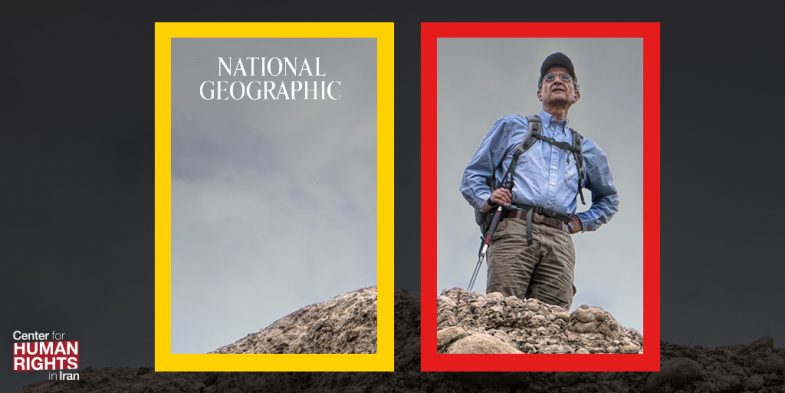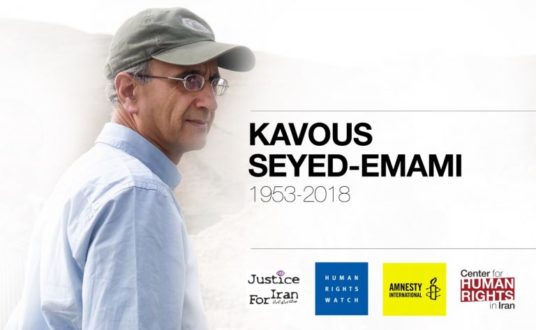CHRI – To the editors at the National Geographic,
March 8, 2019

National Geographic has failed to report on the death of a prominent wildlife conservationist in Iran in an article about wildlife conservation in Iran. The conservationist, Dr. Kavous Seyed-Emami, died in Iranian custody in Tehran’s Evin Prison in February 2018.
I am writing to register my dismay over your recent article, “From Poachers to Protectors, Meet the Rangers of Masjed Mountain” by Kayleigh E. Long (published March 7, 2019).
For over a century, your magazine has not only brought the importance of the natural environment to millions worldwide, it has also supported—and upheld—the highest professional standards. Yet these standards were discarded in Ms. Long’s article. No discussion of wildlife preservation in Iran can be considered complete or even worthy without reference to the fact that wildlife and environmental protection in Iran has effectively become criminalized. Leading wildlife conservationists have been arrested, imprisoned, hounded out of the country and possibly murdered.
Please consider the following facts:
- Nine wildlife conservationists were arrested in January 2018 for carrying out their work as members of the Persia Wildlife Heritage Foundation, and accused without evidence of being “spies.”
- One of them, Kavous Seyed-Emami, the founder of the organization, died under highly suspicious circumstances less than two weeks after his detention in Iran’s Evin Prison. The authorities claimed it was a suicide and have not allowed any independent investigation into his death or independent autopsy.
- The remaining eight, after spending the last year in Evin Prison, much of that time in solitary confinement and deprived of access to counsel, are currently being tried in closed proceedings in which no evidence of their guilt has been presented other than so-called “confessions” which the defendants have stated in court were extracted under torture.
- The eight have been charged with crimes that include espionage and “corruption on earth,” which carries the death penalty in Iran.
- Kaveh Madani, former deputy head of Iran’s Department of Environment, was also detained, interrogated, threatened and forced to flee Iran, after he had left his position as a water management specialist at London’s Imperial College to help Iran address its water crisis.
These events are well known, as international coverage and condemnation has been widespread, and thus could not have been missed by any responsible journalist or their editors. For example:
- The UN, in a statement by its leading experts, called the charges against the conservationists “hard to fathom” and in February 2018 stated, “Nowhere in the world, including Iran, should conservation be equated to spying or regarded as a crime.”
- Leading environmental organizations such as the World Wildlife Foundation have also expressed their “solidarity” with the accused conservationists. For example, Marco Lambertini, Director General of WWF-International, said: “We’re deeply concerned by the situation facing our conservation colleagues in Iran. They are highly regarded experts carrying out vital work in the country, including monitoring of the endangered Asiatic cheetah.” The International Union for Conservation of Nature stated: “IUCN is deeply alarmed by the charges against these dedicated women and men committed to protecting Iran’s rich natural environment and unique species,” with IUCN Director General Inger Andersen noting, “Their work is of crucial importance to their country and its people … IUCN and its Commissions stand in solidarity with them.”
- Major conservation figures such as Jane Goodall and 132 other leading conservationists also issued a joint impassioned defense of their imprisoned colleagues in Iran.
- Protests against the arrest and imprisonment of the conservationists have been lodged by 26 EU governments.
- Major international human rights organizations such as Human Rights Watch and Amnesty International have also condemned their arrests and prosecutions.
Ms. Long writes in her article, “These rangers were once the biggest threat, and now they’re the only protector to the species of Masjed Mountain.” No, there were other protectors of Iran’s endangered species—and nine of them were arrested for their efforts, with only eight of them still alive and all facing grave charges that can bring lengthy prison terms or death. She also writes, “In the wilds of Iran, the protection of species can be a matter of life or death: It’s estimated that some 120 rangers have lost their lives in the line of duty around the country.” Reference to these rangers’ deaths, when such “protection of species” has also resulted in the unmentioned death of Mr. Kavous Seyed-Emami, is an egregious and inexplicable omission. Failure to include any reference to context and to major events that have shaken the environmental community in Iran renders impossible any meaningful presentation of wildlife preservation issues in Iran.
Your mission states that you hold yourselves to the “highest standards of ethical conduct” and that the “fundamental principles we live by are straightforward — always act with honesty, fairness and transparency.” If you felt you could not cover the issue fully and transparently because of political considerations, then the issue should not have been covered at all. It is more than misleading to discuss wildlife preservation in Iran without addressing the fact that this preservation is deeply imperiled by the unlawful prosecution of those carrying out this work. It is unethical, unprofessional and dangerous in that it signals to all governments thwarting environmental work for political reasons that they can do so with impunity.
I urge you to amend the article with the above information and hope that in the future you will return to upholding the highest standards of journalism, ethics and environmental stewardship.
Sincerely,
Dr. Hadi Ghaemi
Executive Director
The Center for Human Rights in Iran
(CHRI is a New York-based nonprofit, nonpartisan and independent NGO dedicated to the protection and promotion of human rights in Iran.)
*Readers can share their thoughts and concerns about this National Geographic article by emailing [email protected].
 Shabtabnews In this dark night, I have lost my way – Arise from a corner, oh you the star of guidance.
Shabtabnews In this dark night, I have lost my way – Arise from a corner, oh you the star of guidance.



